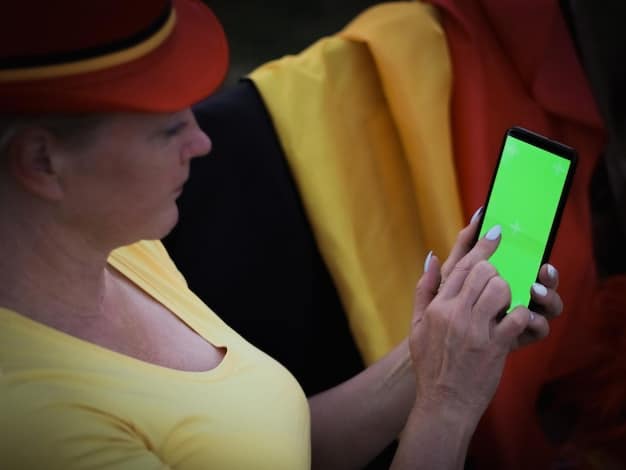US Soccer and Blockchain: Secure Ticketing & Fan Engagement 2025

The integration of blockchain technology within US Soccer in 2025 promises to revolutionize secure ticketing and deepen fan engagement by offering unparalleled transparency, reducing fraud, and creating new interactive experiences.
In the evolving landscape of sports and technology, the intersection of US Soccer and blockchain: exploring the potential for secure ticketing and fan engagement in 2025 stands out as a compelling development. This fusion could redefine how fans interact with the sport, offering solutions to age-old problems like ticket fraud while unlocking innovative avenues for community building and loyalty.
The Dawn of Blockchain in Sports Ticketing
The traditional ticketing model, plagued by issues ranging from counterfeiting to scalping, is ripe for disruption. Blockchain technology, with its inherent transparency, immutability, and decentralization, presents a robust antidote to these challenges, offering a new paradigm for ticket issuance, transfer, and verification within US soccer.
By leveraging blockchain, each ticket can be registered as a unique, traceable digital asset. This not only enhances security but also provides a clear, unalterable record of ownership, ensuring that fans acquire legitimate tickets directly from authorized sources or verifiable secondary markets.
Enhanced Security and Fraud Prevention
One of the most immediate benefits of blockchain in ticketing is its unparalleled security. The cryptographic nature of blockchain transactions makes tickets virtually impossible to counterfeit, thereby eradicating the rampant problem of fake tickets that has long plagued major sporting events.
- Irrefutable Authenticity: Every ticket issued on a blockchain is a unique, verifiable digital token, making it impossible to duplicate.
- Transparent Transaction History: The entire lifecycle of a ticket, from issuance to redemption, is recorded on an immutable ledger.
- Reduced Scalping: Smart contracts can enforce resale rules, limiting price gouging and ensuring fair access for genuine fans.
Moreover, blockchain integration could enable dynamic pricing models and personalized fan experiences that are directly linked to ticket ownership, further disincentivizing illicit resale activities. This shift promises a fairer marketplace for fans and more control for event organizers.
Streamlined Operations and Cost Reduction
Beyond security, blockchain can significantly optimize operational efficiencies for sports organizations. The automation capabilities of smart contracts allow for a more streamlined and less labor-intensive ticketing process, from initial sale to entry management.
This includes automated refunds for canceled events, simplified transfer procedures for legitimate resales, and real-time analytics on attendance and fan behavior. Such efficiencies translate into considerable cost savings, which can then be reinvested into enhancing the fan experience or improving the sport itself.
Embracing blockchain in ticketing is not merely about adopting new technology; it’s about building a more secure, efficient, and fan-centric ecosystem for US soccer events. The foundational principles of trust and transparency inherent in blockchain are perfectly aligned with the need to protect the integrity of the game and the passion of its supporters.
Revolutionizing Fan Engagement with Blockchain Innovations
Beyond the transactional aspects of ticketing, blockchain holds immense potential to transform how fans interact with US Soccer. The technology can foster deeper connections, create new forms of participation, and build stronger, more vibrant communities around teams and players.
This goes beyond simple fan merchandise; we’re talking about direct democratic participation, personalized rewards, and unique digital collectibles that strengthen a fan’s bond with their favorite sport. Integrating these elements can cultivate unparalleled loyalty and foster a truly immersive experience for supporters.
Digital Collectibles and NFTs (Non-Fungible Tokens)
Non-Fungible Tokens (NFTs) have emerged as a powerful tool for digital ownership and fan engagement. For US Soccer, NFTs could represent anything from unique player cards and memorable moments to exclusive access passes and digital memorabilia, offering fans a verifiable stake in the digital legacy of their favorite sport.
These digital assets can serve as collectibles, tradeable items, or even provide utility, such as voting rights on team decisions or access to exclusive content. The scarcity and uniqueness inherent to NFTs drive their value and appeal, creating new avenues for fan interaction and revenue streams for clubs.
- Exclusive Digital Memorabilia: Own unique digital assets celebrating iconic US Soccer moments or player achievements.
- Fan Tokens with Utility: Use NFTs to gain voting power on club decisions or access special events.
- Interactive Collectibles: Engage in games or challenges linked to acquired NFTs, enhancing the fan experience.
The concept of digital ownership through NFTs adds a new dimension to fandom, allowing supporters to feel a closer, more tangible connection to their team and the sport’s history. It transforms passive spectators into active participants in a digital economy centered around their passion.
Gamification and Loyalty Programs
Blockchain can elevate gamification and loyalty programs in US Soccer far beyond traditional models. By recording fan interactions and achievements on an immutable ledger, clubs can implement robust, transparent reward systems that incentivize engagement and loyalty.
Imagine earning blockchain-based tokens for attending games, participating in online polls, or even correctly predicting match outcomes. These tokens could then be redeemed for exclusive merchandise, unique experiences, or even direct interaction with players.

Such programs foster a sense of belonging and reward genuine dedication, making fandom a more interactive and rewarding journey. The transparency of blockchain ensures that these systems are fair and tamper-proof, building trust between clubs and their supporters.
The potential for blockchain to revolutionize fan engagement lies in its ability to create new forms of value and interaction. By bridging the digital and physical worlds, it can offer fans unprecedented ways to connect with US Soccer, transforming casual observers into dedicated, invested community members.
Challenges and Considerations for Implementation by 2025
While the promise of blockchain for US Soccer is significant, its widespread adoption by 2025 faces several hurdles. These range from technological infrastructure and regulatory clarity to user education and cultural acceptance. Addressing these challenges is crucial for a successful transition.
Any large-scale technological shift requires careful planning, significant investment, and a willingness to adapt existing systems. For blockchain in US Soccer, this means navigating complexities unique to both the sports industry and emerging technologies.
Technological Infrastructure and Scalability
The existing infrastructure within US Soccer venues and organizations would require substantial upgrades to fully support blockchain-based systems. This includes robust internet connectivity, secure server environments, and integration with current ticketing and access control systems.
Scalability is another key concern. For major events with tens of thousands of attendees, the blockchain network needs to handle a high volume of transactions quickly and efficiently without compromising security or speed. This demands choosing the right blockchain platform and designing a resilient architecture.
- Interoperability: Ensuring new blockchain systems can seamlessly communicate with existing databases and legacy IT structures.
- Speed and Throughput: Developing solutions that can process large numbers of transactions per second to avoid delays at gates.
- Technical Expertise: Recruiting and training staff with specialized knowledge in blockchain development and maintenance.
The transition period will likely involve parallel systems and phased rollouts to minimize disruption and allow for iterative improvements. Investment in cutting-edge technology and human capital will be paramount.
Regulatory Landscape and Legal Frameworks
The regulatory environment surrounding blockchain and digital assets is still evolving, particularly in the US. Clarity on issues such as digital ownership, smart contract enforceability, and tax implications for blockchain-based collectibles is essential before widespread adoption can occur.
Clubs and event organizers will need to navigate diverse state and federal regulations, ensuring compliance and consumer protection. Legal frameworks need to adapt to address the unique characteristics of decentralized systems and digital assets to avoid legal ambiguities.
Education is also critical; both stakeholders within US Soccer and the end-user fan base need to understand the technology’s benefits and implications. Simple, clear communication about how blockchain works and what it means for their experience will be vital for fostering trust and adoption.
Overcoming these challenges requires a collaborative effort between technology providers, sports organizations, regulatory bodies, and fans. A phased and well-communicated implementation strategy will be key to unlocking the full potential of blockchain for US Soccer by 2025.
Case Studies and Precedents: Lessons from Abroad and Beyond
While US Soccer’s full embrace of blockchain by 2025 is an exciting prospect, it’s worth noting that other sports and industries have already begun experimenting with this technology. Learning from these precedents can provide valuable insights and cautionary tales, guiding a more effective implementation strategy for US Soccer.
From European football clubs leveraging fan tokens to major entertainment venues exploring secure ticketing, the global landscape offers a rich tapestry of experiences that US Soccer can analyze and adapt. These early adoptions showcase both the immense potential and the practical challenges of integrating blockchain.
Notable Sports Implementations
Several high-profile European soccer clubs have pioneered the use of fan tokens, often built on blockchain platforms. These tokens grant supporters various levels of influence, such as voting on kit designs, goal celebration songs, or even charity initiatives.
Clubs like Paris Saint-Germain and FC Barcelona have demonstrated the appeal of these digital assets in fostering a stronger sense of community and direct fan participation. While these are primarily engagement tools rather than ticketing solutions, they prove the viability of blockchain in strengthening fan-club relationships.
Similarly, some sporting events have piloted blockchain-based ticketing systems to combat counterfeiting. The focus here has been on creating unique, untransferable digital tickets that enhance security and streamline entry, providing a blueprint for how US Soccer could approach its own secure ticketing solutions.
Beyond Sports: Entertainment and Events
The entertainment industry, facing similar challenges with secure ticketing and fan engagement, has also made strides in blockchain adoption. Concert venues and major festivals have explored blockchain for ticket distribution, aiming to reduce scalping and provide verifiable entry.
Furthermore, broader applications of blockchain for digital collectibles and loyalty programs in gaming and art offer insights into diversifying revenue streams and creating new fan experiences. These diverse applications underscore the versatility of blockchain beyond its financial origins.

Analyzing these case studies allows US Soccer to understand what works, what doesn’t, and how to tailor blockchain solutions to its unique audience and operational needs. The path to full integration by 2025 will undoubtedly be informed by the successes and lessons learned from these pioneering efforts.
By carefully studying these precedents, US Soccer can strategically implement blockchain technology, leveraging proven concepts while innovating to address its specific challenges and opportunities within the American sports landscape.
The Economic Impact and Future Revenue Streams
The integration of blockchain technology into US Soccer isn’t just about enhanced security and fan engagement; it also unlocks significant economic potential and introduces novel revenue streams. This financial transformation can provide sustainable growth for clubs and the league as a whole by 2025 and beyond.
Beyond traditional ticket sales and merchandise, blockchain can create entirely new ecosystems of value, from digital asset marketplaces to enhanced sponsorship opportunities, fundamentally altering the financial landscape of US Soccer.
Monetizing Digital Assets
The creation and sale of NFTs, as discussed earlier, represent a significant new revenue stream. Clubs can monetize unique digital collectibles—player highlights, historical moments, unique fan art, or exclusive access passes—with each sale generating direct income. Furthermore, passive revenue can be generated through secondary market royalties, where a percentage of every resale of an NFT flows back to the club or league.
This transforms digital content from a marketing cost into a tangible asset, providing a sustainable source of income that is directly linked to fan interest and engagement. It diversifies beyond traditional revenue models, offering a robust financial backbone for future development.
- Primary Sales: Direct revenue from the initial minting and sale of new NFTs.
- Secondary Market Royalties: Ongoing income each time an NFT is resold by fans.
- Increased Fan Spending: Deeper engagement through digital assets can lead to higher overall fan spending on tickets, merchandise, and services.
The success of these ventures will depend on the creativity with which these digital assets are designed and the utility they offer to passionate fans, making them desirable and valuable additions to their digital world.
Enhanced Sponsorship Opportunities
Blockchain can also create innovative opportunities for sponsors. Imagine sponsors issuing their own co-branded NFTs that offer exclusive benefits or discounts, or using smart contracts to link sponsorship activations directly to fan engagement metrics recorded on the blockchain.
This allows for more transparent and verifiable sponsorship ROI, making partnerships more attractive to brands. Furthermore, data collected through blockchain interactions (always with appropriate privacy safeguards) can provide deeper insights into fan preferences, enabling more targeted and effective marketing campaigns.
The economic impact extends to the reduction of fraud and operational costs associated with traditional ticketing, leading to more efficient resource allocation. By mitigating these inefficiencies, clubs can allocate more funds towards player development, infrastructure improvements, and fan experiences, creating a virtuous cycle of investment and growth.
Ultimately, investing in blockchain for US Soccer isn’t just a technological upgrade; it’s a strategic financial move designed to secure future revenue streams and foster sustained prosperity within the sport, cementing its place in the modern entertainment landscape.
Leveraging Blockchain for Athlete and Player Empowerment
The benefits of blockchain in US Soccer extend beyond the immediate stakeholders of clubs and fans, offering groundbreaking opportunities for athlete empowerment and direct financial participation. By 2025, we could see players leveraging this technology to reshape their personal brands and engage with their fan base in entirely new ways.
This innovative approach allows athletes to control their digital presence, monetize their influence directly, and potentially even earn passive income from their past and present achievements in a verifiable and transparent manner.
Direct Fan-to-Athlete Engagement
Blockchain can facilitate direct interactions between athletes and their fans, bypassing traditional intermediaries. Players could issue their own personal NFTs, representing unique moments, signed digital collectibles, or even a share of their future earnings or charitable initiatives.
This direct connection empowers athletes to build stronger personal brands, fostering loyalty and creating new revenue streams that are not solely dependent on club contracts or traditional endorsements. Fans, in turn, gain a more intimate and verifiable connection to their idols.
Consider the potential for player-issued tokens that grant holders exclusive access to Q&A sessions, personalized messages, or unique merchandise. This model creates a symbiotic relationship where fans are rewarded for their loyalty, and athletes gain direct financial and emotional support from their most ardent followers.
Performance-Based Revenue and Ownership
Looking further into the future, blockchain could enable innovative models for athlete compensation tied directly to performance metrics or even fan engagement. Smart contracts could automatically release bonuses based on goals scored, assists, or even fan votes for “player of the match,” ensuring transparent and immediate payouts.
Moreover, players could hold digital ownership stakes in their own image rights or personal brands as NFTs, allowing them to participate in the value generated by their likeness or achievements wherever it is used. This creates lasting economic opportunities beyond their playing careers.
Such models empower athletes with greater financial autonomy and creative control over their unique contributions to the sport. It shifts the paradigm from traditional top-down sponsorships to a more equitable and direct value exchange between players and their global fan base, aligning incentives in unprecedented ways.
The implications of blockchain for athlete empowerment are profound, promising a future where players are not just performers but also direct beneficiaries and innovators within the evolving digital economy of US Soccer. By 2025, this could reshape player-club dynamics and introduce a new era of athlete entrepreneurship.
The Road Ahead: A Phased Approach to 2025 and Beyond
Achieving comprehensive blockchain integration for US Soccer by 2025 is an ambitious goal that requires a strategic, phased approach. It won’t be a single, abrupt technological switch but rather a series of deliberate steps, building on initial successes and adapting to emerging challenges.
This roadmap involves pilot programs, continuous evaluation, and a commitment to scalability and user-friendliness, ensuring that the technology serves the sport and its fans effectively without overwhelming them.
Pilot Programs and Initial Rollouts
The first phase should involve carefully selected pilot programs focused on specific use cases, such as secure ticketing for a smaller series of matches or the introduction of a limited set of fan NFTs for a particular team. These pilots allow for real-world testing, gathering vital feedback, and refining the technology in a controlled environment.
Lessons learned from these initial rollouts—identifying technical glitches, assessing user adoption rates, and understanding fan sentiment—will be crucial for scaling up. This iterative process ensures that subsequent phases are built on a solid foundation of proven functionality and user acceptance.
Education and Community Building
A key aspect of successful adoption is educating the entire ecosystem: fans, club staff, players, and even sponsors. Clear, accessible information about what blockchain is, how it works, and its direct benefits will foster trust and encourage widespread participation. Workshops, dedicated online resources, and engaging content can demystify the technology.
Simultaneously, building strong communities around these blockchain initiatives is essential. Creating platforms where fans can interact, exchange ideas, and share their digital assets can heighten engagement and foster a sense of belonging, transforming early adopters into enthusiastic advocates.
- Targeted Workshops: Educating club personnel on managing blockchain systems and digital assets.
- Fan-Friendly Guides: Simplifying complex blockchain concepts for the average supporter.
- Interactive Forums: Creating spaces for fans to discuss and trade blockchain-enabled assets.
Successful implementation by 2025 hinges not just on technological prowess but equally on a robust strategy for user adoption and community engagement, ensuring that blockchain becomes a seamless and valuable part of the US Soccer experience.
The journey towards a blockchain-enabled US Soccer ecosystem is dynamic and continuous. It requires foresight, flexibility, and a deep understanding of both the technology and the sport’s unique culture to truly unlock its revolutionary potential for secure ticketing, enhanced fan engagement, and beyond.
| Key Benefit | Brief Description |
|---|---|
| 🛡️ Secure Ticketing | Eliminates fraud and scalping through verifiable, unique digital tickets via blockchain. |
| 🔗 Enhanced Fan Engagement | Creates deeper connections via NFTs, loyalty programs, and direct fan-club interactions. |
| 💰 New Revenue Streams | Unlocks monetization through digital collectibles (NFTs) and innovative sponsorships. |
| 🚀 Athlete Empowerment | Enables players to monetize personal brand and engage directly with fans via blockchain assets. |
Frequently Asked Questions
▼
Blockchain is a decentralized, distributed ledger that records transactions securely and immutably. For ticketing, it means each ticket becomes a unique digital asset, verifiable on the blockchain, eliminating counterfeits and providing a transparent record from issuance to redemption, drastically improving security for US Soccer events.
▼
Blockchain enhances engagement through NFTs (digital collectibles), fan tokens (offering voting rights or exclusive access), and transparent loyalty programs. This creates new ways for fans to own digital memorabilia, participate in club decisions, and earn rewards, fostering deeper connections with teams and players.
▼
Key challenges include upgrading existing technological infrastructure for scalability, navigating evolving regulatory frameworks for digital assets, and educating fans and stakeholders about the new technology. Overcoming these requires significant investment, clear legal guidelines, and effective communication strategies.
▼
Not necessarily. While initial infrastructure investment is needed, blockchain’s long-term benefits include reduced fraud, lower operational costs for clubs, and potentially fairer secondary markets through smart contracts. These efficiencies could lead to more stable or even lower prices for authentic tickets, benefiting fans by curbing scalping.
▼
Players can benefit by issuing personalized NFTs (digital collectibles or fan tokens), directly engaging with fans, and creating new revenue streams beyond traditional salaries. This empowers athletes by giving them more control over their brand, monetizing their influence, and fostering direct fan support.
Conclusion
The journey for US Soccer and blockchain: exploring the potential for secure ticketing and fan engagement in 2025 is not merely an adoption of new technology but a strategic evolution. By leveraging blockchain’s inherent security, transparency, and innovative capabilities, US Soccer is poised to tackle long-standing issues like ticket fraud while simultaneously unlocking unprecedented avenues for fan interaction and economic growth. The path forward will require careful planning, investment in infrastructure, and continuous education, but the promise of a more secure, engaging, and digitally empowered soccer landscape is well within reach, fundamentally reshaping the fan experience and the sport’s business model for decades to come.





